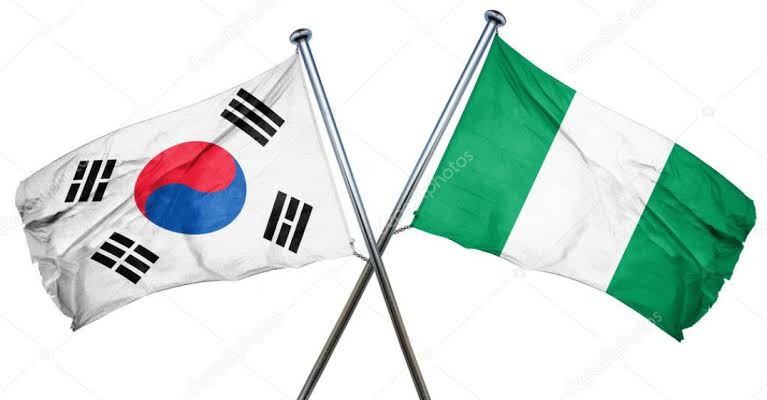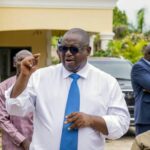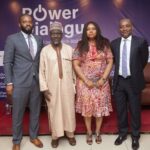By John Okeke
The bilateral relations between the Federal Republic of Nigeria and the Republic of South Korea has come along way .
The both countries enjoy a friendly relationship since establishing its bilateral ties.
The Federal Republic of Nigeria and the Republic of Korea established diplomatic ties in February 1980. Nigeria has been one of the most important friends of Korea in the African continent. Since 2011, bilateral trade volume between the two countries exceeded 3 million US dollars, making it the second largest trading partner for Korea in Africa.
In 2021, the trade volume between the both countries rose to $2 billion. This feat, which was highly commended by some international commentators, forecast a higher volume by the end of this year.
The Korean Ambassador to Nigeria, Mr. Kim Young Chae, made the disclosure, when he addressed the media on the heel of the election of Yoon Suk-yeol as South Korea’s President-elect recently.
He said that the bilateral trade figure was a 50 per cent increase compared to that of 2020. He said the boost in bilateral trade occurred in spite of the COVID-19 pandemic.
“I hope that this year our bilateral trade rises further and at the end of the day I want to see Nigeria become Korea’s biggest trading partner in Africa. Nigeria is the biggest economy in Africa, so it should be Korea’s number trading partner among Africa’s countries,” Kim said.
The ambassador said the balance of trade between both countries was driven mainly by Korea’s manufactured goods, like plastic and aluminum related products and Nigeria’s oil and gas.
“We are importing a lot of Nigerian gas to further increase our bilateral trade. Of course oil and gas is very important, but we want to see some agricultural products from Nigeria and manufactured goods in order to penetrate into Korean market.
“I hope more Nigerian companies will study Korean markets and Korean consumers. For example, we import a lot of sesame seed and I know that Nigeria produces a lot of sesame seed. There is a huge potential for Nigeria’s sesame seed or sesame oil,” he said.
Meanwhile, the Republic of Korea is seeking Nigeria’s support and commitment towards the set objectives of the $13 million Digital Governance Programme.
Speaking during the recently conducted two-week pre-kick-off survey for the project titled: “Project for Building Foundations Towards Digital Governance in Nigeria (2021~2026),” the KOICA Nigeria Country Director, Mr. Sungil Son said engagements with government stakeholders was focused on the need to have all commitments from the Nigerian government.
The Republic of Korea through its grant aid agency, Korea International Cooperation Agency (KOICA) Office in Nigeria in collaboration with the Federal Ministry of Communications and Digital Economy (FMCDE) recently conducted a 2-week pre-kick-off survey for the project.
The project seeks to enhance Nigeria’s e-Government implementation system through the update of the current Nigeria’s e-Government Master Plan (NeGMP), upgrade of Nigeria’s Enterprise Architecture and development of a 10-year eGovernment Implementation Plan.
Other objectives of the project include improvement in competencies for e-Government service delivery through capacity building programs designed for policy makers and technical officers at both federal and state levels of government, enhancement of the quality of government digital services through the activation of the Government Service Portal www.services.gov.ng and create increased access for NIN enrolment through the establishment of additional NIN enrolment units.
Many of Korea’s top enterprises operate in Nigeria, including various sectors such as trade, power and energy.
Exchanges of high level government officials have been active as well. Since the first visit of the President Obasanjo to the Republic of Korea in the year 2000, which was followed by the visit of the South Korean President Roh Moo-hyun to Abuja in 2006. Later that year President Obasanjo made his second visit to Seoul, which underlined the importance of the existing diplomatic ties between the both countries.
In 2010, former Korean Prime Minister Dr. Chung Woon-chan visited Abuja as the Special Envoy to congratulate the 50th Anniversary of Nigeria’s Independence and the 30th anniversary of establishment of diplomatic relations. President Goodluck Jonathan also visited the Republic of Korea to attend the 2nd Nuclear Security.
In addition to its Embassy, the Republic of Korea has two other important institutions located in Abuja: the Korean Cultural Centre Nigeria, and the Office of the Korea International Cooperation Agency (KOICA).
The former is actively promoting cultural exchanges between Korea and Nigeria, while the KOICA Office is serving as a focal point in coordinating Korea’s grant aid implementation in Nigeria under the auspices of the Embassy.
The Korean International Cooperation Agency (KOICA) has continued to engage the Nigerian government in e-government through investment in Information Communication Technology.
They have also invested huge some of money doing so in the country in the past years.
KOICA has so far spent more than $500 million towards the realization of e-Government establishment for Nigeria.
In Lagos, the Republic of Korea maintains a branch office of the Embassy and the Office of Korea Trade-Investment Promotion Agency (KOTRA).
The 1st Vice Minister of Foreign Affairs Ministry of the Republic of Korea, Mr. Choi Jong Kun, visited Nigeria last year.
During his visit he said that Nigeria is very important to South Korea.
He reiterated his country’s commitment to strengthen bilateral relations with Nigeria in the areas of economy and technology, health and cultural orientation.
“We will strengthen relationship on economic area, because, Nigeria provides us with a very vast market. More than half of our foreign construction sale in Africa comes from Nigeria.
“The second area is the trans-national security, especially in the Gulf of Guinea, a lot of hijack happens in the Gulf, thus, we need to protect our fishing industry in the Gulf.
“Another area is, culture and people to people exchange, which will include financing education exchange between universities and students, because, Nigeria offers meaningful African cultures to Koreans and East Asian people,” local media reports on Friday quoted Choi as saying.
According to him, a cultural delegation from Nigeria will be touring the US and South Korea and that in December, South Korea would host a Korea-Africa Forum.
“In the Forum, we will have discussions and collaborations in many areas like economy, trade, culture and many others.
“We have founded Korea-Africa Foundation to boost cultural awareness between Africa and Korea. It is devoted to cultural orientation,” Choi added.
In the area of technology transfer, Choi disclosed that technology is an exclusive good that can be transferred and that high technology companies from South Korea would come and start operation with talented, smart and innovative young Nigerians.
He said Nigerian students could come over to Korea to get higher degrees in technology, stressing that Korea has good training courses on high-tech.
On COVID-19 pandemic, Choi said that South Korea was closely working with the United States and our European partners to build a vaccine factory and that South Korea is “the second largest vaccines producers in the world”.
He also said that South Korea had supplied testing kits, face masks and other medical supplies worth over $200 million to about 53 countries in Africa including Nigeria.
Nigeria’s Minister of State for Foreign Affairs, Ambassador Zubairu Dada, told his Korean counterpart that Nigeria and the Republic of South Korea shared many things in common.
He noted that the visit was timely and it would enable the two nations to explore more areas of friendship that would be beneficial to both countries. According to Dada, Nigeria cherished and appreciated the visit of the South Korean Vice Minister to Nigeria and Africa which is the first of its kind from South Korea.
He said the visit would open up a new chapter in the Nigerian-Korean relationship. Dada however said to further strengthen bilateral cooperation, the two countries would be meeting again in the 6th Session of the Nigeria-South Korea Joint Commission in Seoul, Republic of Korea in October this year.
The Minister of State for Foreign Affairs also stressed the need to further deepen both countries’ ties of cooperation in various areas. He stated that Nigeria attached great importance to the political, economic, defence, education and other spheres of her bilateral relations with the Republic of Korea.
On global security challenges, Ambassador Dada said that countries were still witnessing global terrorism of enormous magnitude and Nigeria had its own share of these challenges, especially in the Sahel, Lake Chad Basin as well as piracy in the Gulf of Guinea.
He informed that as compounded as the situation remains, Nigeria and her security forces including efforts of regional and international partners remain resolutely committed to continue to contain them and address their root causes.



